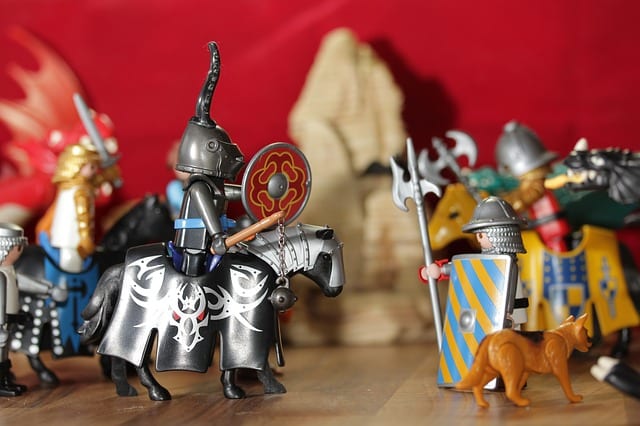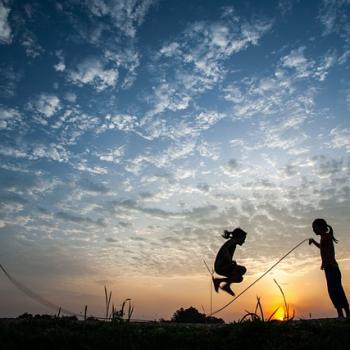
Rosie handed me a piece of brown construction paper with circles drawn on it. “Can you cut these out?”
I did. She arranged them in plates on her dollhouse table, and put a yellow dot of construction paper confetti on each. Then she arranged the action figures around the table in a tableau of domestic bliss, eating pancakes. Later the action figures got into their usual trouble, walking the dog and running into the increasingly silly neighbors that live in Rose’s dollhouse’s neighborhood. Then the father action figure went to work, where he is a “rescue hero” who solves mysteries and fights against eccentric Batman-style villains to save the town. She used to move the action figure for every step in the imagined game; now she sets the action figures up in a tableau, and talks out the game without touching them very much. Someday, she will imagine the scenarios without the help of toys and play the whole game out in her head. Then she will write it out, revise it, write another draft, and share it with the world.
There’s a strange notion that growing up condemns the imagination to a death– the Lost Boys not having to be tied to the bedpost anymore because they forgot that they were able to fly. I always rebelled against stories that perpetuated that notion. I covered my ears when I heard “Puff the Magic Dragon.” I only read J. M. Barrie’s novelization of Peter Pan once and I didn’t like it very much, for the ending. I loved to watch Mary Martin zipping around the stage in the musical version of that story, but I disliked that ending as well. Christopher Robin leaving the Hundred Acre Wood ruined the other Pooh stories for me. I despised Aslan for telling the children they could never go back to Narnia because they were too old– and no, The Last Battle doesn’t make that any better. I hate The Last Battle. It’s a terrible book. I read the rest of the Chronicles of Narnia until the covers fell off, but I barely bent the pages of The Last Battle. Aslan is a cruel, stuffy and annoyingly Protestant metaphor for Jesus.
I couldn’t believe that Narnia had gone away and become Heaven. You had to die to go to Heaven. I wanted to believe there was still a way to get to Narnia while alive, to have adventures and fight witches to save people who were turned to stone, and there is. That way just looks a little different when you’re grown up.
Rosie doesn’t like fairy stories; she thinks they’re foolish. I’ve pointed out that the Power Rangers, Godzilla, Kamen Rider and Transformers she loves are also a kind of fantasy, but she won’t hear of it. Those are sensible, because the magic is performed through scientific gizmos and chemistry accidents rather than more whimsical ways. The stories I like are not realistic like hers.
Rosie wants to be an author and a park ranger when she grows up. This career path was my suggestion: I pointed out that she loved making up stories with the action figures and that people loved hearing about her stories when I wrote them down. And I pointed out that she is avid about nature documentaries and learning all she can about biomes; she gets furious when people react to \ animals such as sharks and snakes as if they’re purely dangerous and ought to be killed. She wants to educate the world about pollution and conservation. She loves going for nature hikes with her father and can’t wait until we get a car so I can show her the Greenbriar river and the Monogahela National Wilderness. Her action figure father fights crime but also knows first aid and ecology. I said a park ranger was a career where she could do all those things, and she could write stories in her spare time.
Last night we looked at college majors she’d need to train as a park ranger.
She’s only nine, of course. She got tired of hearing me drone about college very quickly. College, at this age, is as much a fantasy as becoming a Power Ranger. Rosie is more interested in watching nature documentaries and reading DK Eyewitness books, and taking the hiking trail down to the park to play on the swings. But she’s got a passion and a huge imagination, and she firmly believes she can help change things for the better. I’m not going to let that die.
I was raised to think that those passions, that thirst for justice we so often find in intelligent nine-year-old children, also died as the children became adults. They were the same as childhood fantasies: silly things to be gotten over. Children believe they can save the world and adults settle down to live a life of quiet, respectable despair. Children believe in making things better and grown-ups wait for the sweet release of death. I was even taught the horrendously spiritually abusive principle that God always gives you the opposite of your desires, so that you can suffer and offer it up. As if the spark of joy in His creation and glorious thirst for justice He placed in all of us are stumbling blocks to our salvation, rather than the tools He left for us to use to follow Him.
If there’s one thing I can teach Rose, I hope it’s that her impassioned love of nature and contempt for those who hate it are gifts from God. She’s supposed to have them. They’re her sword and shield for the battle she was born to face. Growing up will be a matter of learning to wield the sword and shield, not dropping them in surrender to despair.
If there’s one thing I can teach the world, it’s that you can still be heroic.
It won’t look the way you first envisioned, when you read your fairy stories or watched your Saturday morning cartoons. But everything that was good in those, is real.
The passionate child you were didn’t die; she just deepened and went within.
You are supposed to have fantasies about what might be, because those fantasies tell you the truth.
You are supposed to be a hero. You’re supposed to fight wicked witches and pirates and dragons. You were born to fulfill prophecies, to morph into a colorful superhero, to have adventures, to go on expeditions to discover the North Pole, to rescue your friends who were turned to stone. All of that is not going to look the way it looked before the child in you went within, but it’s real.
The despair you feel is not being a grown-up. It’s the witch trying to turn you to stone, but you’re not fully stone yet. You can still dodge out of the way. The One coming to help heal the stone parts of you is much nicer than Aslan. And the adventure you’re going to have will have a much better ending.
I didn’t fully realize any of that until I watched Rosie serve her dollhouse family pancakes, but I realize it now.
Image via Pixabay
Mary Pezzulo is the author of Meditations on the Way of the Cross and Stumbling into Grace: How We Meet God in Tiny Works of Mercy.
Steel Magnificat operates almost entirely on tips. To tip the author, visit our donate page.













